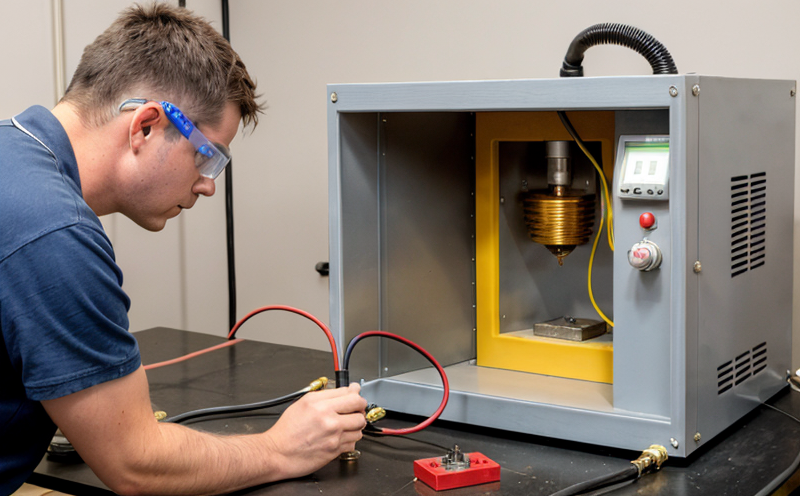ASTM B193 Resistivity of Magnesium Alloys
The ASTM B193 standard provides a comprehensive procedure to measure the resistivity of magnesium alloys. This is critical in ensuring that materials used across various industries meet stringent quality standards, thus enhancing product reliability and performance.
Magnesium alloys are widely used in aerospace, automotive, and electronic devices due to their lightweight properties. Understanding the electrical conductivity of these materials helps engineers optimize designs for efficiency and durability. By adhering to ASTM B193, laboratories can perform precise measurements that contribute significantly to the development of innovative products.
The resistivity measurement is essential because it influences how electrons flow through a material under an applied electric field. Higher resistivity implies lower electrical conductivity, which can impact the performance of components in circuits and devices. For instance, in aerospace applications, reduced weight from magnesium alloys translates into fuel savings, while maintaining or enhancing electrical properties ensures reliable operation.
ASTM B193 specifies detailed procedures for sample preparation, testing apparatus, and data interpretation. Sample cutting must be precise to minimize errors, ensuring accurate resistivity readings. The test setup involves connecting the specimen between two electrodes in a controlled environment to apply voltage and measure current. This method adheres strictly to international standards such as ISO 6723-1 for electrode preparation.
The process yields highly reliable results when conducted correctly. Compliance with ASTM B193 ensures that magnesium alloys meet specific industry requirements, enhancing trust among stakeholders. For quality managers, this data is crucial in maintaining consistent product performance and meeting customer expectations. Compliance officers benefit from the standardized approach to testing, ensuring regulatory compliance.
R&D engineers can rely on these tests to innovate materials with improved properties. Procurement teams use such data to source high-quality alloys that meet design specifications efficiently. In summary, ASTM B193 is vital for any organization dealing with magnesium alloys in critical applications where material integrity and performance are paramount.
Applied Standards
The ASTM B193 standard aligns closely with other international standards such as ISO 6723-1, which provides additional guidelines on electrode preparation. These standards ensure that laboratories conduct tests uniformly across different regions and industries. Adherence to these norms minimizes discrepancies in results, leading to more accurate comparisons between samples.
ASTM B193 specifies the exact procedures for specimen preparation, including dimensions and tolerances. This precision is critical because even minor variations can significantly affect resistivity readings. The standard also outlines safety precautions for handling magnesium alloys, which are flammable under certain conditions. Properly following these guidelines ensures a safe working environment.
The testing apparatus used should comply with ASTM B193 requirements to ensure accurate measurements. This includes the voltage source and ammeter, both of which must be calibrated regularly to maintain accuracy. The setup involves placing the specimen between two electrodes connected to the voltage source and ammeter. Applying a known voltage across the specimen allows for precise current measurement.
Acceptance criteria defined in ASTM B193 dictate how results are interpreted. If the resistivity value falls outside specified limits, further investigation may be necessary. This could involve retesting or revisiting sample preparation techniques to identify any issues. By adhering strictly to these standards, laboratories can ensure that their measurements are consistent and reliable.
Eurolab Advantages
At Eurolab, we pride ourselves on delivering exceptional service in metallurgy and material testing. Our expertise in ASTM B193 resistivity of magnesium alloys is unmatched, ensuring accurate and reliable results that meet the highest industry standards.
Our state-of-the-art facilities are equipped with the latest technology to perform these tests efficiently. We employ highly trained technicians who adhere meticulously to ASTM B193 procedures, providing consistent and repeatable results. Our laboratories are ISO 9001:2015 certified, ensuring that our processes meet international quality management system requirements.
For our clients, this means peace of mind knowing that they receive accurate data for decision-making purposes. Our reporting is detailed and comprehensive, including all relevant parameters and adherence to standards. Compliance officers can rely on Eurolab's services to ensure regulatory compliance across their operations.
We also offer additional value-added services such as custom testing protocols tailored to specific client needs. Our R&D engineers collaborate closely with clients to develop innovative solutions that improve material performance. For procurement teams, we provide robust quality assurance through our testing services, helping them source the best materials for their projects.
Use Cases and Application Examples
- Aerospace Industry: In aerospace applications, magnesium alloys are used in engine components where lightweighting is crucial. Accurate resistivity measurements ensure that these parts perform optimally without compromising safety or reliability.
- Automotive Sector: Automotive manufacturers use magnesium alloys for body structures and chassis to reduce vehicle weight. Precise resistivity testing helps optimize design choices while ensuring electrical integrity in circuits.
- Electronics Industry: In the electronics sector, magnesium alloys are employed in heat sinks due to their excellent thermal conductivity. Testing their resistivity ensures that these components function efficiently without causing overheating issues.
- Military Applications: The military uses magnesium alloys in armor plating for its lightweight properties. Resistivity testing helps ensure that these materials meet strict performance criteria, enhancing the protection of personnel and equipment.
In each of these industries, accurate resistivity measurements are essential to optimizing material performance and ensuring safety. By leveraging ASTM B193 standards, organizations can achieve consistent quality across their operations.





